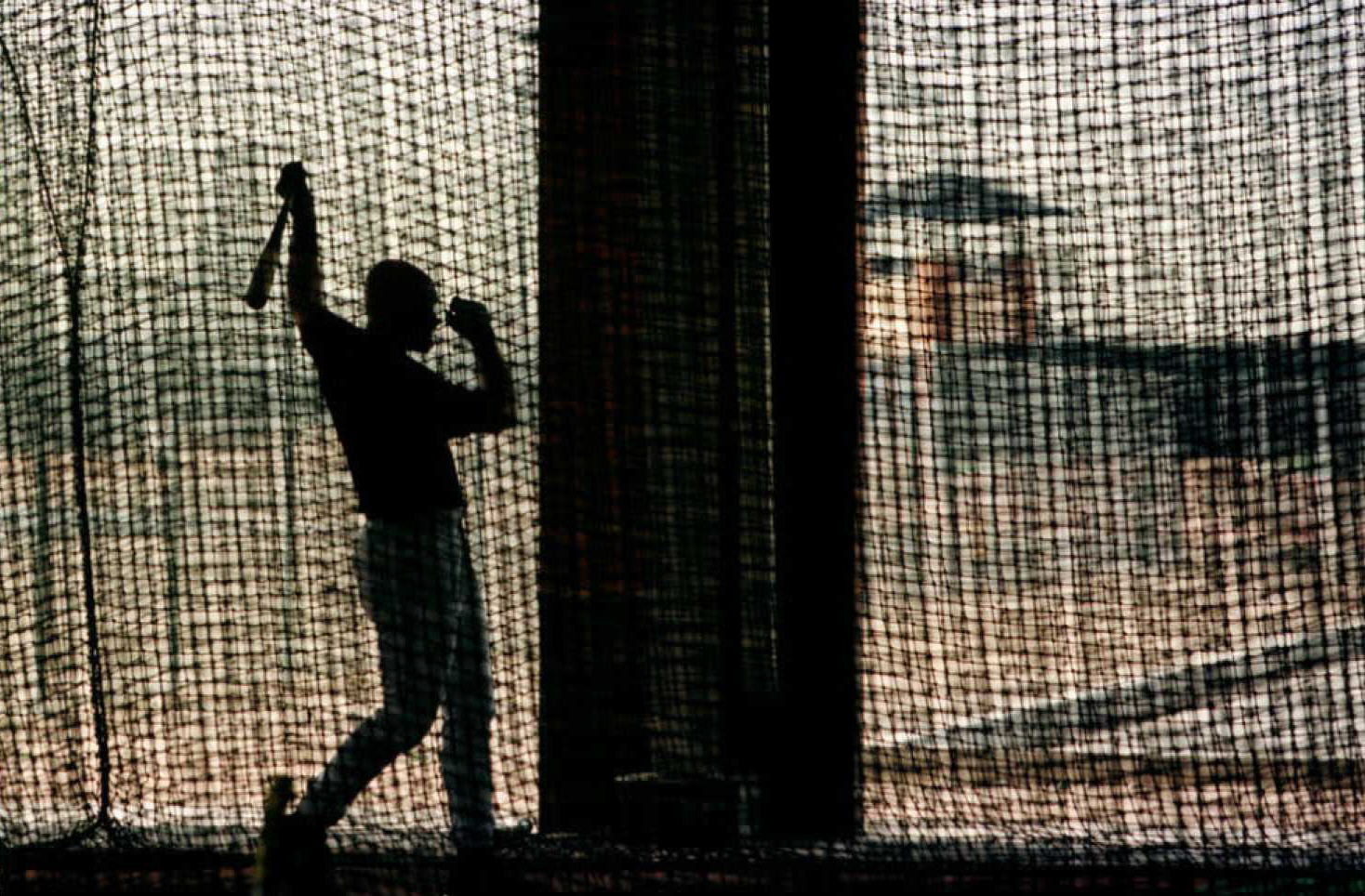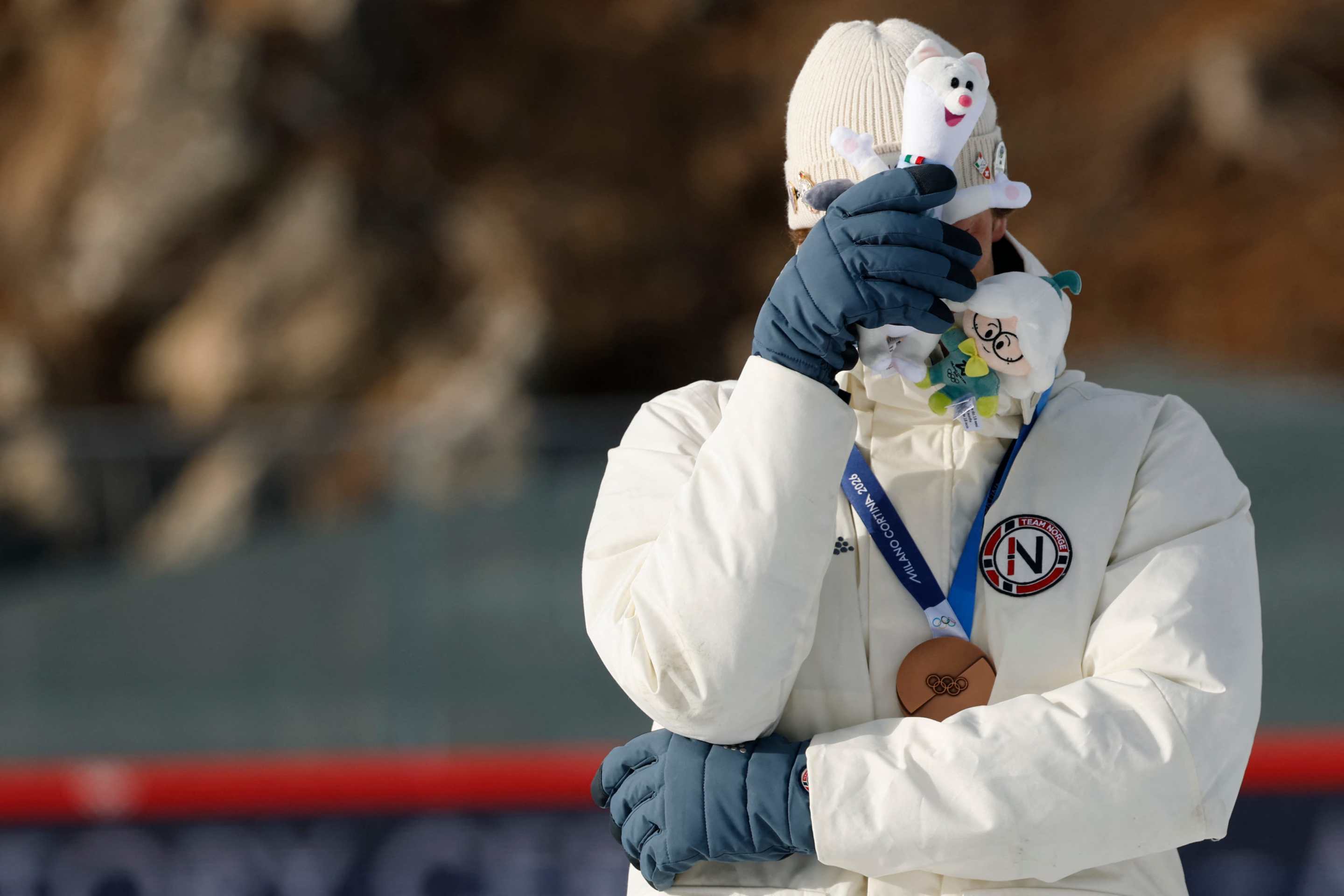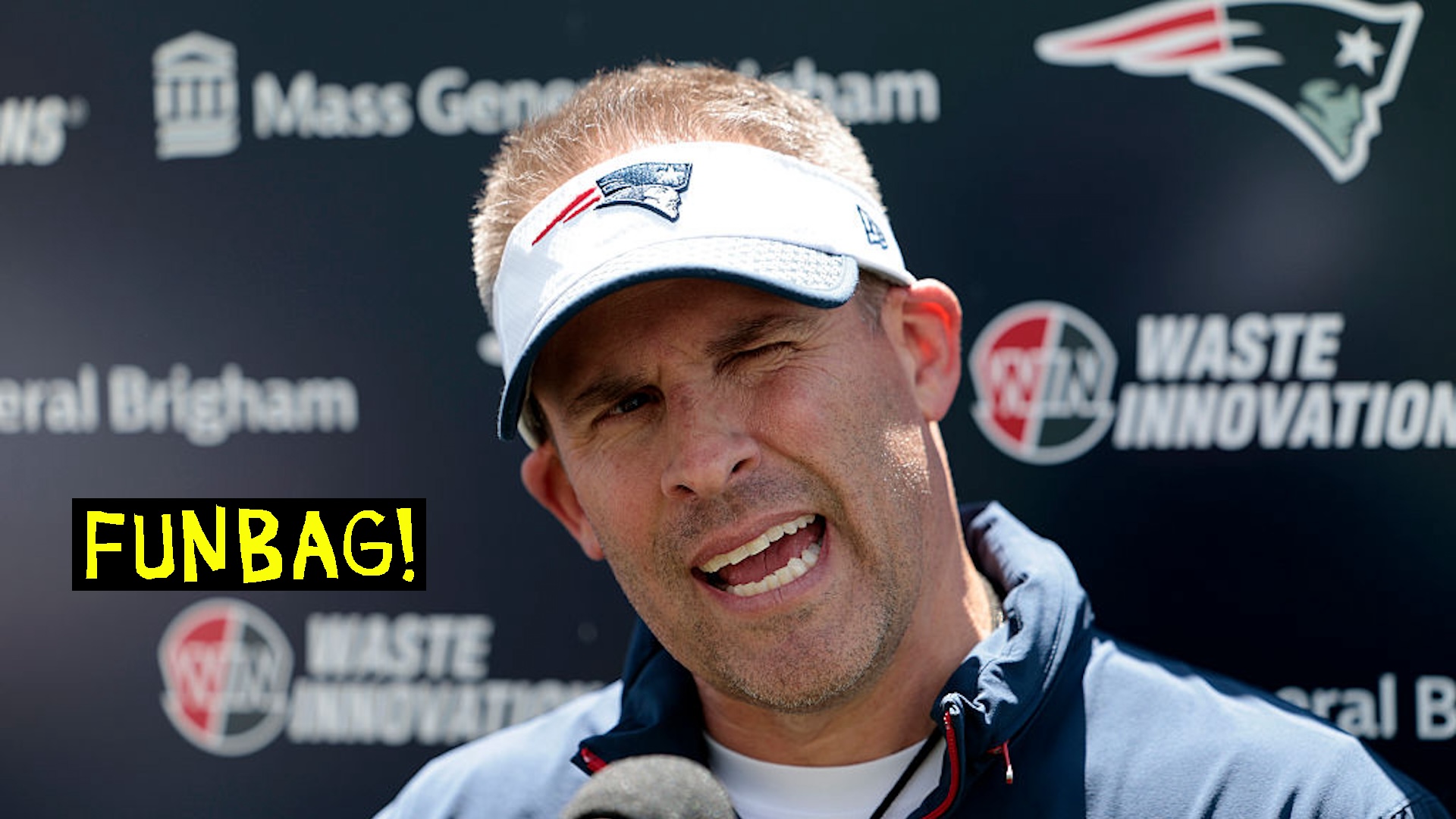I’m having a hard time remembering if there were any sports I didn’t play when I was a kid. I learned to ice skate when I was 5, and with my tiny stick and miniature skates I did some early-elementary approximation of hockey. There was soccer, of course, because every suburban kid of that era played soccer. I played a year of tackle football when I was in fourth grade. That’s an inherently ridiculous sport for any kid at that age—these squeaky boys all grunting like they’re tough men as they wear shoulder pads like they would their dad’s ties—but it’s especially silly for someone who grew up to put on blue eyeshadow several times a week.
There was a year of baseball, as well, in sixth grade; I could barely hit but also rarely made errors at first base thanks to my willingness to smother errant throws rather than stay rooted to the bag. And then there was flag football, where I was actually a pretty reliable, agile wide receiver because none of the real football players even acknowledged the existence of the bastardized flag version. There was track, which was just long stretches of awkward, nausea-inducing exercise on still-growing legs mixed with long stretches of aimless lounging in the bleachers. There was a summer of group tennis lessons that provided decent cardio but were most notable for ending in a massive water balloon fight on the final day. I had a set of golf clubs that actually got some decent use for a few seasons until I made more friends as a teen. I played basketball for a half-dozen years. I remember that I had the height to be a good 4 or 5 when I was in the older of the two age groups they stuck together but was relegated to an unremarkable 2 or 3 when I wasn’t. That was the last sport to go, after freshman year of high school. It’s probably not a coincidence, I’m realizing now, that I figured out I liked boys about that exact same time.
My body is nearly unrecognizable now compared to what it was then. In the years after I left organized sports I was cruel to it in countless ways, expressing my hatred for it by giving it cigarettes or denying it food or forcing down alcohol. I’m nicer to it now; when I feel those urges I usually just try to lie down and sleep. But the changes I’ve imposed on my physical self since puberty mark my every square inch. I’ve succumbed to wearing these oversized cat-eye glasses all the time, and not just when I need to see the board. My hair falls in thick waves down to my ribcage, far beyond what my parents used to allow. Once upon a time I grew facial hair better than most boys at my high school, but a bunch of painful and expensive laser sessions have made shaving just a vestigial habit. Further down, I have tattoos. I have curves now. I dress the way that I should have always dressed. I’m told that I walk in a noticeably different manner. My skin is smooth from the massive doses of spironolactone I take twice a day. I weigh less, and my arms are weaker, and all of it makes me a happier person.
But I was thinking about the athletic boy I used to be throughout my read of Detransition, Baby, the debut novel from Torrey Peters that arrived in January. One of the three main characters in the story goes by Ames. He’s a trans girl who detransitioned, meaning he lived as a woman but is now known to those in his life as a man. The novel begins with him learning that his girlfriend, Katrina, has unexpectedly gotten pregnant, and it follows his attempts to devise some sort of plan for raising this child that also involves his trans ex-girlfriend Reese, who has always longed for motherhood and could provide the additional support that Katrina needs.
I loved Peters’s weird and sexy novellas for the way they centered relatable disasters as protagonists and for how unafraid they were to avoid the clichés of those respectable trans stories that practically beg for mainstream acceptance. She soothes any fears that she may have sold out by diving into the kinkiness in Reese’s affair with a married man in the very first chapter. But what surprised me was that Peters’s kind and empathetic portrayal of Ames—particularly the times she chooses to reveal crucial information about his past experiences as Amy—is one of the novel’s best qualities, and it stands out as a complex picture of a detransitioned woman in a world where those girls’ stories are too often used as a weapon against trans people.
Well-meaning and strategic efforts to control the message around detransitioning had me going into the book thinking of it as a conscious, rational choice that some trans people make, either for money or friends or love. But in the case of Amy, it feels more like an unraveling. “Masculinity had always been what allowed Amy not to feel,” Peters writes. Eventually, we learn, Amy was pushed so far that the invulnerability of numbness became her most appealing path forward.
The prospect of becoming a parent starts to shake an almost ghostly Ames out of the masculine cocoon he’s woven for himself over the last three years. In the final chapter, the complications of the plot have him seeking out the company of his old college baseball teammate Jon, whom Peters tells us is a friend he sees “roughly twice a year, whenever something goes wrong in one of their lives.” The pair share a similarly understated and logic-focused mindset when it comes to processing emotions, and Jon, though a very minor character, seems to understand exactly what his friend needs at this time.
Amy was a very good baseball player, one who led her Minnesota high school league in stolen bases one year. Peters tells us that she would move around the bases like a “twitchy squirrel,” and that, due to her habit of getting on base by HBP, “bruises brindled her left arm and torso from March until June.” Now, at this difficult point in Ames’s life, Jon suggests that they return to an old college ritual and work things out in batting cages. In a previous flashback, one where a teenage Amy skips an awards ceremony to lose her virginity, Peters suggests that baseball is part of something traditionally masculine that the young girl has to escape. But here, we see how the sport has managed to stay with her, in a pleasant way, all these years since. Regardless of how her body looks or feels at any point in her life, the game still fills up her bones.
While Jon pays, Ames grabs a bat, shares a terse nod with the old-timer behind the counter, then Velcros closed a batting glove tight to his left hand and takes a few practice swings. The old ritual comes to him without thought. Ames’s shoulders hum with loose energy as the bat goes round and he waits for a cage to open. He finds a perverse comfort in the way his body reacts, a bodily experience below thought. Maybe Jon really does know something of somatic therapy, in his own way.Back when Amy and Reese lived together, on certain spring and summer evenings, Amy would walk down to the Parade Ground at Prospect Park, where the high school boys, mostly Dominicans, played baseball. She came for the thwack that occurred when a ball thrown hard and straight struck the leather pocket of a glove. She longed for that sound. She longed for her own high school past that snapped forward out of time’s stream at the necromantic power of baseball’s thwacks and plonks. She’d sit on a bench, far enough away that the boys—or their dads—wouldn’t make eyes at her, and she’d listen as the sounds of the game raised the ghosts of muscle memory. She could feel the batter’s step forward, readying the pendulum of body weight to swing to the timing of the pitcher’s windup. At every heard thwack the muscles in her arm came alive, remembering how her glove jerked back at the impact, how they sprang to snap a throw from third to first. All that smooth power her body had once had, ready to obey her every thought. She had missed it. She missed how obviously impressive it had been. The way women noted that impressiveness with their eyes and other boys chose her as their friend. The ease with which it all had been given to her.
As Ames settles into the routine of the cages, as he finds calm in the repetitive noises of the machinery, the protective layer that he’s placed between his mind and his body starts to fray. He starts to feel again; he starts to recognize his body and its abilities again. He doesn’t rediscover, exactly, the woman that he had been a few years prior. But this old activity prompts him to come to terms with himself—or at least recognize someone beyond the zombie he disappeared into when femininity became untenable.
Back before all this gender shit, her body was like a good dog. Maybe it wasn’t fully her, but her dog did everything she wanted: she moved so fast, pulled himself up trees, sprinted through forests and across fields, giddy and waggy. She was lucky to have gotten a dog like that. She didn’t deserve such a good dog. She’d thought she’d have that dog forever—when they were both old, he would lay at her feet like a canvas duffel, loyal and obliging and charming to the last.[...]When Amy transitioned, she lost her dog. There was just her. She and her body were one and the same. Every sensation simply belonged to her, unmediated. It was supposed to be good. Sometimes it was. She didn’t have to guess what was going on from her dog’s behavior. But without a dog to hurt for her, on her behalf, her life as a woman arrived with pain; pain that had to be endured, withstood, pain that was the same as being alive, and so was without end.As Jon bats, Ames tries to listen to his body. He has not thought about his dog in a long time. Does he still have a dog? In his detransition, he supposed he’d get his dog back, but he didn’t. He has simply lost the vibrancy of both pain and pleasure. The world has receded to a tolerable distance, the colors unsaturated, while the dog stayed dead. In a certain cowardly way, he supposes that he has avoided thinking about it, hoping that this is enough. But of course, he has lived the last three years of his life in a way that requires so little of him—an office job of moderate ambition; a relationship that, as much as he really believes he loves Katrina, came to him without quite searching for it; friends who know him well, but not too well. Only now, with this baby, this work of his traitorous, animal body, does he need an inclination of his truest feelings. When Jon wears himself out, Ames takes a second turn. The bat goes round and round, and each time it is a prayer, beseeching the dead to speak.
Soon after, we finally hear Ames articulate what he wants and needs from the woman he loves: understanding and acceptance of the fact that he may not forever remain a man as she knows him.
I don’t miss being a boy, not even a little bit. Even in my darkest moments I cannot imagine a worse fate than moving backward into a male-presenting form. But I recognized in this passage something I do want to recapture. There’s an assuredness in Ames as he comes back to this thing that he’s always been good at, and as he embraces hitting baseballs once again, and feels his minute-to-minute coping mechanisms get stripped away by mindless, instinctual physical activity, something crucial comes back to him. Despite all its connotations and all his history, it’s not any kind of masculinity. It’s a rediscovered awareness of who she is.
I watch sports constantly, almost every day, because it’s my job and because I love them. But I don’t really get to play them anymore. My body’s workload in quarantine consists of near-daily sit-ups in my bedroom (I can’t stand the idea of any other muscles getting bigger), occasional walks, and the long climb up the stairs to my roof. Even beyond the pandemic, though, it’s nothing like when I was a kid. I threw a football around with my dad when he helped move me out of my last apartment. I got rinsed by him and my brother playing “21” in the driveway back when I was in Michigan. I don’t own a bike anymore. I did play softball a few times a year back when I worked at Deadspin. I don’t have the strength to even knock the odd single over the shortstop now, so I’m reduced to whacking strategic grounders towards third. I played disc golf at least once with some friends who are very serious about disc golf and my arm got sore almost immediately. I haven’t gone swimming in five years, which might be the loss I mourn the most.
When I keep rereading Peters’s writing, I think I’m looking for my batting cages—that almost churchlike place that offers peace and focus without all the gender bullshit or world bullshit, that can connect Former Boy Me with Current Girl Me without ever forcing me to label it quite like that. It’s been so hard to keep my sense of self intact when everyone is isolated, when there’s nothing to do and it’s all just memory and consumption and maybe what kind of makeup I put on before a Zoom call. So often our understanding of ourselves comes from bouncing off the world around us and seeing what bounces back. Though I know that I must have changed in this past year of life, I’m keenly feeling a want of new experiences or new people or anything that seems like moving forward. I’m longing for this to be over so I can lose myself in something, in order to find myself again.






